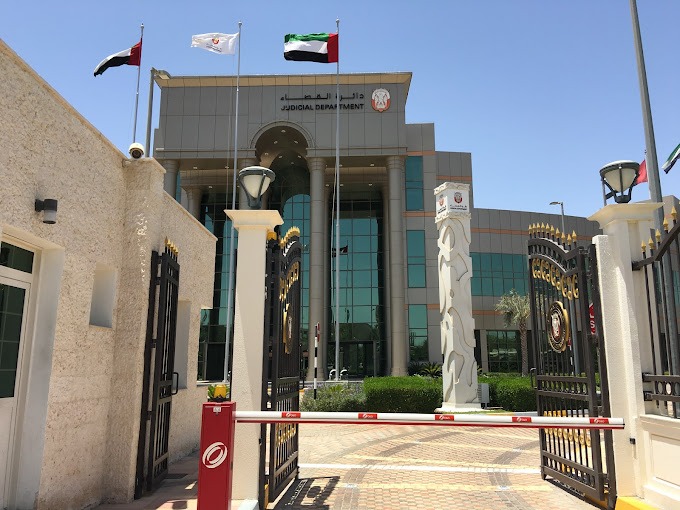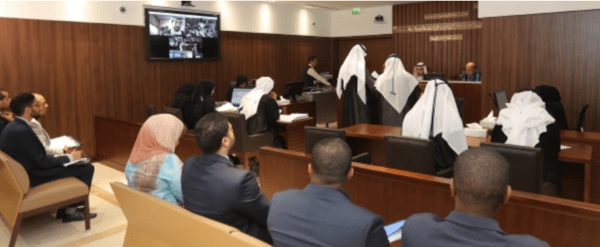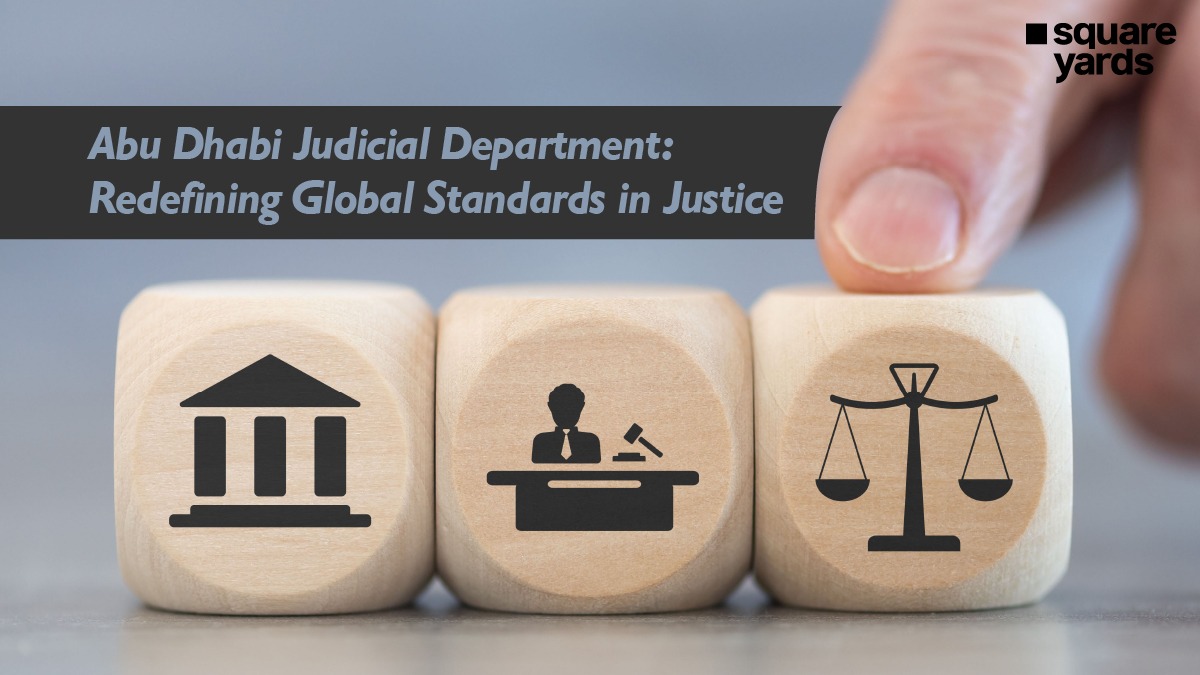Have you ever wondered how society would function without any laws? Imagine a world with no rules to govern behavior, no regulations to ensure fairness, and no legal system to resolve disputes. Such a scenario could lead to chaos, where it might make right, and individuals have no protection against injustice. The absence of laws would create an environment of uncertainty and insecurity, making everyday life unpredictable and dangerous. Laws form the foundation of a civilised society, offering structure, stability, and justice. For the same reasons, the Abu Dhabi Judicial Department, Abu Dhabi comes into play. This judicial department in Abu Dhabi plays a crucial role in maintaining these values by ensuring justice and structure in every legal proceeding. Let’s dig in and learn more about the Abu Dhabi Judicial Department.
Understanding the Abu Dhabi Judicial Department

The Abu Dhabi Judicial Department (ADJD) is a key institution in the Emirate of Abu Dhabi, tasked with upholding the rule of law and ensuring justice is served. It was founded in 2007 under the direction of the late His Highness Sheikh Khalifa bin Zayed Al Nahyan. It was established to provide a fair and efficient legal framework.
The Abu Dhabi Judicial Department oversees various courts and legal entities, including civil, criminal, and commercial courts. It offers various services, from dispute resolution to public prosecution and notary services. Moreover, the ADJD Abu Dhabi has integrated digital services to streamline legal processes and enhance user experience. Its commitment to maintaining a just and orderly society underscores its vital role in the governance and social structure of Abu Dhabi. The Department’s mission is to uphold justice, freedom, and peace, with a 2008-2013 plan to reach world-class standards.
Abu Dhabi’s Judicial System
The Judicial Department in Abu Dhabi is a remarkable blend of traditional values and modern legal principles, addressing various legal needs. The Abu Dhabi Judicial Department is led by His Highness Sheikh Mansour bin Zayed Al Nahyan, who also serves as the UAE Vice President, Deputy Prime Minister, and Chairman of the Presidential Court. Under his guidance, the ADJD Abu Dhabi has developed a reputation for its efficiency and precision in legal proceedings, ensuring swift and accurate justice. Currently, the judicial system runs on three main components, which include:
- The Judicial Council
- Judicial Department Administration
- Public Prosecution
Abu Dhabi’s Court System

The Abu Dhabi Judicial Court is structured to ensure justice is served efficiently and fairly through a hierarchical court system. Here are the types of courts that will help you to understand the court system more deeply:
-
Courts of First Instance in Abu Dhabi
These courts handle initial legal disputes, covering civil, commercial, criminal, and family cases. They are divided into major chambers (three judges) for complex cases and minor chambers (one judge) for simpler matters.
-
Courts of Appeal in Abu Dhabi
The Courts of Appeal review decisions made by the Courts of First Instance. A panel of three judges reconsiders these cases, ensuring thorough scrutiny across various domains such as civil, commercial, and personal status disputes.
-
Court of Cassation in Abu Dhabi
The highest judicial authority in Abu Dhabi, the Court of Cassation, reviews legal issues from the Courts of Appeal, resolving jurisdictional conflicts and ensuring consistent application of the law. It also oversees the actions of senior officials in the emirate.
-
Specialised Courts in Abu Dhabi
Specialised courts can be created based on the recommendations of the Judicial Council to handle particular types of disputes and to define their specific jurisdictions. Additionally, a single court may be structured to include multiple functions, such as initial case hearings, appeals, and enforcement of judgments, to streamline judicial processes. Below given are some of the Specialised Courts:
-
- Traffic Courts: Deal with traffic violations and related offenses.
- Labour Courts: Address disputes between employers and employees.
- Commercial Courts: Handle business-related disputes and commercial transactions.
- Civil Family Court: Established in 2021, this court deals with family law issues for non-Muslim residents, including civil marriages, divorces, and inheritance matters.
-
Abu Dhabi’s Judicial Department Digital Services
The Abu Dhabi Judicial Department has revolutionised the legal process with digital services. Imagine filing a case, attending a virtual hearing, or accessing legal documents without leaving your home. These digital innovations make legal proceedings more transparent, accessible, and efficient. Some of the digital services are:
-
- Case Roll
- Appeals Case Register
- Courts Request
- Case Inquiry
- Child Visitation
- Legal Aid
- Smart Fees Calculator
- Court Forms
Alternative Dispute Resolution
The Abu Dhabi Judicial Department (ADJD) provides a range of ADR services, including mediation, arbitration, and conciliation, to offer efficient and amicable solutions to disputes. These methods help parties resolve conflicts without the need for lengthy court proceedings, saving time and resources while maintaining confidentiality and promoting harmonious relationships.
-
- Mediation: Mediation involves a neutral third party who helps disputing parties reach a mutually acceptable solution. The mediator facilitates communication, encourages understanding, and assists in negotiating a resolution. Mediation is voluntary and confidential, aiming to resolve disputes efficiently without going to court.
- Arbitration: Arbitration is a formal process where disputing parties agree to submit their conflict to one or more arbitrators, who make a binding decision. This method is less formal than court proceedings and can be faster and more cost-effective. The arbitrator’s decision is usually final and enforceable by law.
- Conciliation: Conciliation, similar to mediation, involves a conciliator who meets with the disputing parties separately or together to resolve their issues. The conciliator provides non-binding suggestions and helps guide parties toward a settlement. Conciliation is a voluntary process focused on preserving relationships and achieving a practical solution.
-
Other Services
To further assist those navigating the legal landscape, the Abu Dhabi Judicial Department (ADJD) offers a variety of additional resources. These resources are designed to enhance understanding, provide guidance, and support individuals in their legal matters. Here are some key resources available:
-
- The UAE Legal System: Understanding the structure and functions of the UAE legal system is crucial for anyone dealing with legal issues. ADJD provides comprehensive information about the country’s legal framework, including the roles of various courts, legal principles, and procedural rules. This helps individuals understand how the legal system operates and what to expect during legal proceedings.
- Finding a Lawyer: Locating a qualified lawyer can be a critical step in resolving legal matters effectively. ADJD offers directories and resources to help individuals find reputable lawyers and legal professionals in the UAE. These resources include information on lawyer specialisations, contact details, and guidance on selecting the right legal representation for specific needs.
- Glossary of Legal Terms: Legal terminology can often be complex and confusing. To aid in comprehension, ADJD provides a glossary of legal terms commonly used in the UAE legal system. This glossary serves as a valuable reference tool, helping individuals understand legal documents, court proceedings, and communications with legal professionals.
Department of Public Prosecution
Public Prosecution in the Abu Dhabi Judicial Department (ADJD) handles criminal cases. They start investigations, collect evidence, and present cases in court. They ensure that criminal cases are followed through the court process until a final decision is made. Public Prosecution also manages the execution of criminal judgments and can get involved in civil cases involving certain individuals or situations. They offer digital services like petition permissions, case inquiries, and appeals through the ADJD app.
-
- Filing and Managing Criminal Prosecutions: Public Prosecution plays a vital role in the criminal justice system of Abu Dhabi. They spearhead criminal investigations, meticulously gather evidence, and present solid cases in court, ensuring justice is pursued rigorously.
- Monitoring Cases Through the Courts: Public prosecutors track cases from the investigation stage to the final judgment, ensuring that all procedures are conducted thoroughly and fairly.
- Supplementary Judicial Competencies: The Public Prosecution also handles specific civil cases, intervening to protect vulnerable individuals such as minors and absentees.
- Enforcement of Criminal Sentences: They ensure that the rulings in criminal cases are executed promptly and correctly, reinforcing the authority of the judicial system.
-
Digital Services for Public Prosecution
The ADJD offers digital services to make legal procedures more accessible. Through their mobile app, users can:
-
- Petition Submission Permission
- Requests Pertaining to Criminal Cases
- Grievance Against Criminal Case Decisions
- Judgment Settlement
- Request to Transfer Traffic Violations to Court
- Case Inquiries
- Lawyer’s Case Cassation Request
- Rehabilitation Application
- Public Prosecution Service Appointment
- Passport Seizure Request
- Appeal Submission
- Objection Filing
- Human Rights
Additional Services
-
Notary Services:
The Abu Dhabi Judicial Department provides a comprehensive suite of notary services, ensuring your legal documents are authenticated and valid, this also includes issuing power of attorney, verifying signatures, and handling pledges and partnership contracts. They authenticate service agent agreements, sales contracts, and mortgage documents, and provide proof of date and certified duplicates. Embracing the digital age, they also offer electronic document authentication. They address matters of Islamic law, employment contracts, administrative agreements, marriage declarations, and no-objection certifications. Additionally, they verify income, property ownership, succession notices, guardian appointments, and records of parentage and adoption. Additional services include marital status, custody arrangements, donations, wills, endowments, and divorce proceedings. They ensure the legal validity of marriage contracts and enforceable documents, supporting all your personal, business, and legal transactions with precision and reliability.
-
Alternative Dispute Resolution (ADR):
The Abu Dhabi Judicial Department recognizes and promotes Alternative Dispute Resolution (ADR) mechanisms to settle disputes outside the traditional court system. Popular ADR methods include conciliation, mediation, and arbitration. These approaches offer efficient and less adversarial solutions to conflicts. Through the ADJD website or application, you can access services such as family guidance, conciliation and reconciliation for civil and commercial disputes, and applications for registration after referral. Family guidance consulting is also available to help individuals resolve personal and family-related issues. These services reflect the Department’s commitment to providing accessible and effective dispute-resolution options.
Conclusion
The Abu Dhabi Judicial Department exemplifies the commitment to justice in the emirate, combining traditional judicial practices with modern technology to ensure accessibility and efficiency. Whether through diligent public prosecution, comprehensive court services, or innovative ADR methods, the Abu Dhabi Judicial Department upholds the principles of justice for all residents.
Similar Suggestions For You:
|
You Know About Tawtheeq Abu Dhabi |
|
|
Know About Abu Dhabi Tenancy Laws & Rules |
|
|
Laws That Govern Abu Dhabi’s Real Estate Sector? |
|
|
Perfect Domestic Helper with Tadbeer UAE |
Frequently Asked Questions (FAQ’s)
Courts in Abu Dhabi City include the Municipality Court located in Abu Dhabi Municipality, the Traffic Court in the Traffic and Patrols Directorate building in Al-Zafarana, the Nationality and Residence Court at the General Administration of Residence and Foreigners Affairs and the Labour Court situated in Mazyad Mall, Mohammed bin Zayed City.
You can contact the Abu Dhabi Judicial Department by visiting their headquarters at 16 Al Nawfal Street, Al Rawdah. They are available via email at info@adjd.gov.ae, through WhatsApp at +971-60-059-9799, and by phone at +971-2-651-2222.
Court marriages in the UAE are legally recognised and provide a streamlined process for couples to formalise their union. This involves submitting necessary documents like identification and proof of eligibility, making it especially suitable for expatriates and non-Muslim residents. What Other Courts Are Located in Abu Dhabi City Outside the Headquarters of the Judicial Department?
How Can I Contact the Judicial Department of Abu Dhabi?
What Does the Law Say About Court Marriages in the UAE?




